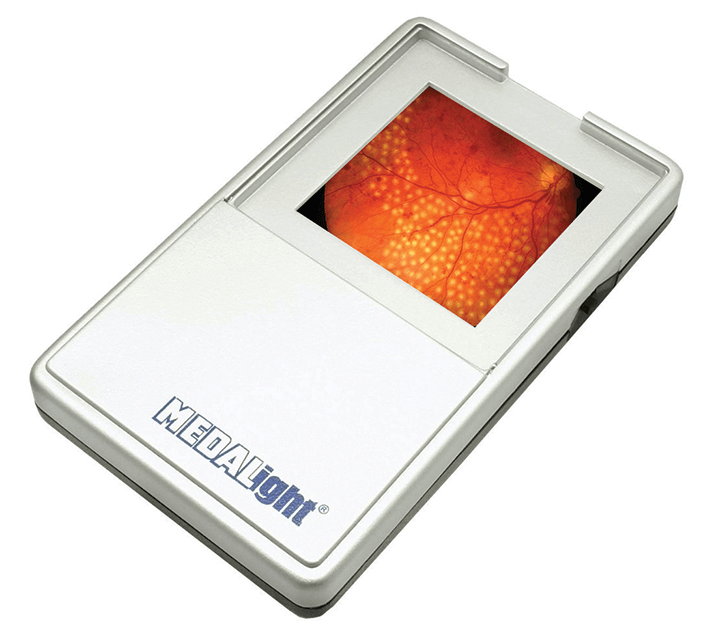
How do you train an ophthalmologist to use a laser for the first time? If you don’t have access to a computer-based simulator, there are some imaginative alternatives. Take laser photocoagulation on a “simulated fundus” as an example (1) – a piece of paper that has been photocopied black on one side, and some basic retinal vasculature drawn on in pen on the white side, is taped to the laser headpiece, and suffices as an extremely inexpensive practice medium – it’s okay, but it’s certainly something that can be improved upon.
That’s exactly what UK-based ophthalmologist Seema Arora and Leadership Fellow in Simulation, Polly Dickerson, decided to do (2). Instead of attaching paper to a retinal laser’s headpiece, they attached 35 mm photographic slides depicting retinal pathologies and a small battery-operated lightbox (Figure 1) to the laser machine’s forehead rest. How does it work? Trainees apply the laser beam directly to the slides without the need for a contact lens; they can try out different pulse durations and investigate treatment options for various procedures. Images can be projected to multiple viewers before and after treatment, which supports group training and discussion – and Arora and Dickerson have developed a “recipe book” of faculty requirements and debriefing discussions in their training materials to maximize the benefits of the slides. Slides can also be printed with photographs of the angle structure – ideal for practicing selective laser trabeculoplasty. Although the 35 mm slides are both inexpensive and easy to use, there is one big drawback; laser burn intensity cannot be titrated on them. Nevertheless, Arora and Dickerson view the slides as “a cost-effective and widely available tool that has the potential to democratize access to simulated laser training.”
References
- AW Cohen, et al., “Learning to use the PASCAL laser system; a part of on-going professional development” (2009). Available at: http://bit.ly/1PLdiNh. Accessed May 26, 2015.
- S Arora, P Dickerson, “35 mm slides – a novel target to simulate laser treatment”. Poster presented at the Royal College of Ophthalmologists Annual Congress; May 19–21, 2015; Liverpool, United Kingdom. Available at: http://bit.ly/1Ey1rpQ. Accessed May 26, 2015.
